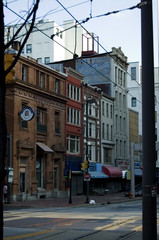Congratulations to community artist Iandry Randriamondroso on the successful completion of his B’MORE Birds project!
Over the course of the last several months, Iandry has worked closely with residents of the communities along the York Road corridor between Glenwood and 43rd street to create a series of five murals depicting native birds of the Govans forest patches. Last Friday, BOPA joined corridor residents, York Road Partnership, Govanstowne Business Association, Loyola York Road Initiative, Councilman Bill Henry and the Department of Transportation in celebrating Iandry’s work.
ABOUT THE BIRDS
The Oriole
4331 York Road
Baltimore Orioles are bright orange birds with black and white wings that sound almost as beautiful as they look. Their smooth, whistling songs are commonly heard in orchards, backyards, and gardens. Baltimore Orioles mostly eat insects and fruit, such as raspberries and mulberries. Their sturdy, hammock-like nests are suspended from branches high in trees, woven together with grasses, hair, spider webs, twine, and wool.
The Cedar Waxwing
4811 York RoadCedar Waxwings are bold colored birds with rusty brown bodies, black face masks, and orange or yellow wax-tipped tails. They are often found in flocks, filling themselves with berries from a variety of plants, such as mulberry trees and honeysuckle shrubs. They are common in residential areas, staying in Maryland all year round.
The Red-bellied Woodpecker
5017 York Road
Red-bellied Woodpeckers are common woodpeckers found in wooded areas that have a red cap, black wings, and a warm beige belly. Their large black bill is used for drilling into dead wood to pull out insects and larvae with their barbed tongues. They also drill cavities inside dead trees to lay 2-6 eggs and raise their young over a month-long period.
The Blue Jay
5219 York Road
Blue Jays are the local noisy neighbors in wooded residential areas, with their loud jaaaaay calls that easily distinguish them. They are pale to bright blue and white birds that eat a variety of insects, nuts, and seeds. They also sometimes eat eggs from other birds’ nests and are aggressive at the local bird feeder. Blue Jay eggs are blue to light brown, within nests placed approximately 20 feet above ground in trees.
The Black-and-White Warbler
5219 York Road
Black-and-white Warblers are small, black and white striped birds that live in forests. Often seen creeping along tree branches, they eat a variety of insect larvae hidden in the wood, along with ants and beetles. They spend the winter months in Mexico and migrate up to Maryland to breed in the summer, building well-hidden nests on the ground near tree trunks.
This project was made possible by funding from the Baltimore City Department of Transportation as part of Baltimore’s 1% for Public Art Program.





















